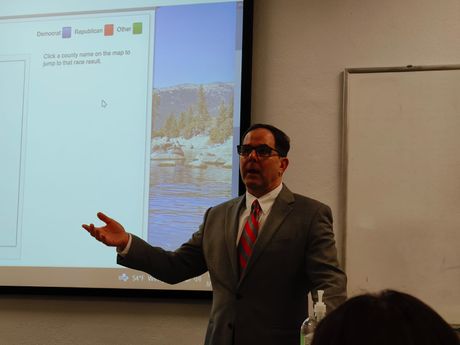For some abortion is trauma, for others right to choose: Will this problem unite Democrats in US elections?

The decision made by the US Supreme Court to ban abortion two years ago caused strong reactions not only in that country, but also around the world. Many Republicans saw the decision as a major victory, although analysts believe the move cost them in the 2022 congressional elections.
Although a lot of time has passed since then, this issue is still very current among voters, so it is no wonder why many believe that it could decide the winner in the upcoming presidential elections in November.
University of Nevada political science professor David Damore, Ph.D., says the abortion issue is very important in the upcoming election, especially for Democrats.
"The overturning of the Roe v. Wade ruling really united Democrats. It didn't just happen in Republican-majority states like Kansas or mixed ones like Ohio. In Nevada, for example, pro-abortion groups are trying to push this initiative. If that happens, there could be a mobilization of Democrats and independent voters who are not too happy about Joe Biden's election," said Professor Damore.

He added that Democrats in some states see this as an opportunity to recruit women who left the Republican Party because of Trump.
"It will be interesting to see how Republicans handle it. Maybe they will introduce certain prohibitions into their policy, which is what Democrats sincerely hoping for. In states like Nevada, freedom-loving spirit is very important, so it is not surprising why Democrats are trying to elevate this issue," he said.
In the United States, abortion laws vary between states. After the Supreme Court overturned Roe v. Wade, many Republican-majority states decided to seize the opportunity to ban abortion.
This is currently the case in Texas, Alabama, Arkansas, Idaho, Indiana, Kentucky, Louisiana, Mississippi, Missouri, North Dakota, Oklahoma, South Dakota, Tennessee, West Virginia, while in Arizona abortion is legal up to 18 weeks of pregnancy.
A Telegraf portal journalist was in the US in March and during the program, organized by the FPC, she had the opportunity to, together with journalists from other countries, attend meetings organized by two organizations in Ohio that have opposing views on the right to abortion.
How did they reinstate this right after short-lived Ohio ban?
Ohio was one of several states where the abortion ban went into effect as a result of the court's decision. However, this was was later reversed.
The deputy director of Pro-Choice Ohio, Jaime Miracle, spoke about the period of 82 days when abortion was banned in this federal state.
"People couldn't get access to the care they needed. They couldn't use their private insurance to pay for an abortion, unless their life was in danger. When the decision went into effect, I spoke to a clinic worker that day, and she said that she didn't know how she was going to make calls and cancel all those appointments without breaking down. I told her that I don't know how she's going to do it, because when I read her message I immediately cried. During that period, we heard from women that they couldn't start chemotherapy while pregnant. This is what those 82 days looked like. So that's when we really saw the danger of banning abortion. Many legislators who voted for the ban were shocked, exactly what they were told would happen, did happen," she said.
Miracle then explained that their organization did not want to accept this decision and that they soon realized they had to act urgently.
"The change came when we started collecting signatures for a petition in January of last year, and by the end of the campaign in the state of Ohio we had collected 700,000 signatures. People were excited to sign the petition," she said.

In a referendum last August, after more than three million ballots were counted, 57 percent of voters were "against", while 43 were "for."
"After that, we continued the battle. We had an incredible grassroots campaign. We knocked on a million doors, we made 4.4 million phone calls," she said.
In November of last year, a referendum was held to change the Constitution of that state regarding whether to include the right to abortion and other reproductive health protections.
"Unlike in August, 3.8 million voters turned out in November and the abortion amendment won with 57 percent," she explained.
Ohio was the only state in 2023 that considered a statewide constitutional right to abortion.
"Trauma is not healed by more trauma"
Although the right to abortion was restored in Ohio, there are organizations in this federal state that are still fighting against the decision. Peter Range from Ohio Right to Life, which advocates for abortion ban, spoke about why the right to life is very important by giving the example of his father, who was paralyzed from the neck down twice.
"I think that from that experience with my father and growing up with him, I learned, you know, some really valuable lessons. One is that love is a choice that we make every day, and I know couples where a spouse has left for much less than what happened to my parents, but my mother stayed with my father through all those years. I learned that life is dignified and valuable. Each of you, regardless of your faith, background, beliefs or lack thereof. Each of us is made in God's image. And our value and dignity derives from that fundamental reality. I would say the same thing to pro-choice advocates, that they are also made beautiful with the power to do wonderful and powerful things. I don't judge them because their position is different than mine," said Range.

He added that although they failed last year to convince citizens in Ohio to vote in the referendum in favor of the policies they advocate, his organization still continues to work with people in the legislature and educate them.
Many advocates of abortion rights use the example of women and girls who have been raped or are in a very difficult financial situation and do not have the means to care for a child as an argument in favor of abortion, but Range has an answer to that.
"I think we have to understand that these are very difficult situations. First of all, in the case of rape. There is almost nothing more terrible that you can do to another person than to sexually assault them. That is terrible, terrible trauma. However, the procedure of abortion itself is also a trauma. One trauma is not healed by adding on another," he said.

Regardless of the results of the November elections, he believes that this is a topic that should be discussed in the coming period, and explained his plans are for that period.
"One of the things I really want to do is to try again at the federal level to fight for a few things. One is called 'Care for Her Act'. This law will offer help and support to pregnant women, in the sense that the father of the child will not start paying alimony only when it is born, but from the moment the child is conceived because that way mothers will be able to afford prenatal vitamins and pay for doctor's appointments. It will also help women find housing and resolve all matters of similar nature," he said.
Range added that it was necessary to reduce the cost of delivering a child, and that their senator was already considering this issue.
"I have four children right now and I'm trying to convince my wife to have a fifth. We can make childbirth here in Ohio free, so there are no economic barriers. These are policy things that can be moved forward, so we can meet the current needs of mothers, as we build a kind of broader vision of dads and moms moving forward together. Because if we really want solutions, to issues of poverty and drug use and things of that nature, we need strong fathers in the household," he concluded.
Although these two factions are very strong in Ohio both in terms of their stances they hold, and the support they receive, it seems that the voters will have the final say on this topic in the November elections.
(Telegraf.rs)
Video: Počela manifestacija "Noć legata“
Telegraf.rs zadržava sva prava nad sadržajem. Za preuzimanje sadržaja pogledajte uputstva na stranici Uslovi korišćenja.

